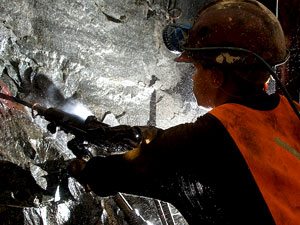
[miningmx.com] – MASTER Drilling Group lifted its exposure to South African mining in the six months ended June, largely owing to a contract at Kolomela, an iron ore mine owned by Kumba Iron Ore, the Anglo American subsidiary.
Total revenue generated for the interim period was $65.2m of which 36% was from South Africa compared to 31% of the total revenue pie in the corresponding period of the previous financial year. Revenue was about a fifth higher year-on-year.
And there’s an opportunity the home-grown company’s involvement locally could increase yet further if plans by Anglo American Platinum (Amplats) to sell its non-core Rustenburg mines materialises.
New owners of the platinum shafts may seek Master Drilling to assist in cutting costs at mature businesses, although Danie Pretorius, CEO of Master Drilling, wouldn’t be drawn on the exact nature of the potential.
“As we speak, especially for Anglos [Amplats], the Rustenburg side is not doing well. There’s not a lot of capital being spent, so who knows … I think we think we would come somewhere in that [restructuring],” he said.
Sibanye Gold, which is a client of Master Drilling in South Africa, has expressed an interest in bidding for non-core platinum mines, although conclusion of any deal is not expected to materialise until 2015.
Said Pretorius: “On our side, we are extremely busy and the key word is mechanisation and optimisation, and to reduce the labour complement.
“Our definition of mechanisation is not about replacing a [hand-held] rock drill with a jumbo [a rig with several drilling booms]; when we talk about mechanisation, we mean a non-blasting environment,” he said.
Master Drilling offers services in traditional drilling and exploration, but its flagship technology is raise bore drilling which allows for excavation between two underground levels. Pretorius said intellectual property (IP) of this ilk is a profit driver for the group.
Earnings attributable to shareholders increased 20.9% to $9.3m, part of which was on currency translation as the rand weakened to 10.6 versus 9.3 against the dollar during the period. However, Pretorius said the company’s efficiencies was a margin driver.
“Our cost base is one of the upsides that we have; our capital base is much lower and so we build machines at much lower costs. But what is under-estimated is the efficiency side. We are 20% to 30% better than the opposition; that’s the IP we developed”.
As stated in the company’s 2012 pre-listing statement, the company has a large capital bill related to expansion of its fleet which has held back any returns.
Andre van Deventer, Master Drilling CFO, said the capital outlay would taper in the next financial year and could, perhaps, open a way to cash-in-hand returns to shareholders which include Investec Asset Management and Coronation Asset Managers.
Shareholders have enjoyed more than decent capital appreciation in the share although the stock was plateaued since early June.
“Liquidity is an issue,” said Deventer. “There is not a lot of trade that is happening. Every time we do a results announcement, we have a spike in price, but with the share being held so tightly, it doesn’t move much,” he said.
Shares in Master Drilling increased to R13/share towards the end of trade on the Johannesburg Stock Exchange. The company was recorded a 40% return on a 12-month basis.










